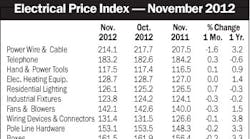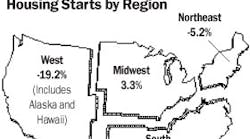While Brazilians were sambaing through the streets of Rio de Janerio when they learned their country would host the World Cup and Olympics, they probably weren’t thinking about the headaches and hassles that would come with the massive amount of construction it would take to prepare their country’s infrastructure for the influx of tens of thousands of sports fans and other international visitors. Toss in the discovery of several massive oil fields off the Brazilian coast during the past few years, and you have the makings of one heckuva party for this proud country. It’s a bash that several international distributors of electrical supplies, including Rexel, Sonepar and W.W. Grainger, will be in on because they have purchased several Brazilian distributors over the past two years.
It all sounds like a grand time, but it’s a party that could get shut down if billions of dollars of infrastructure projects aren’t completed before the opening whistle of the first World Cup match on June 12, 2014. The Brazilian government wants to win the world’s admiration for hosting the World Cup and Olympics and is said to be spending more than $200 billion on new airports, stadiums, roadways, housing, mass transit and ports. However, an Engineering-News Record (ENR) article back in Feb. 2011 said many of these projects were suffering from delays because of “poor management by government agencies, delays in environmental licenses and delays in getting funds released,” and that the government had only spent $55 billion of the $296 billion it planned on spending for transportation, power, water and sewage as well as housing-related projects from 2007 to 2010. However, a more recent ENR article said six of the 12 stadiums being built for the World Cup are on track to be completed within the next 12 months.
In addition to all this construction activity, there’s the monumental oil discoveries about 200 miles off the Brazilian coast. According to a Federal Reserve Bank of Atlanta publication, the Tupi oil field discovered in Oct. 2006 is the largest oil field found in the Western Hemisphere in 30 years and Petrobras, Brazil’s state-run oil company, has committed to investing $224 billion through 2014 in its plan to develop deepwater fields off the country’s coast.
There’s little doubt all of this economic activity factored into the decisions by Rexel, Sonepar and Grainger to acquire distributors in Brazil over the past two years. Most recently, Sonepar SA, Paris, acquired Rosa Leal, reportedly the fourth biggest name in the Brazilian market with 12 operating companies, 700 employees and 16 branches.
Rosa Leal had 2011 sales of R$85 million (US $113.27 million) and will be adding to Sonepar’s growing business in Brazil, where it has been operating since 2001. Sonepar says that in 10 Brazilian states that account for 80 percent of the country’s economic activity, it now has 12 operating companies: Centelha, Dimensional, DW, Eletronor, Emel, Petrocam, Proelt, Proex, Rosa Leal Painéis, Sandler, Tecnosisa and Walter Schmidt.
Rexel SA, also of Paris, has also invested millions in Brazil through the acquisitions of three distributors. As previously reported in Electrical Marketing, Rexel International acquired Brazil’s Delamano and Etil in February, adding R$100 million ($130.7 million) in sales. Rexel had also previously acquired Nortel Suprimentos Industriais, a large industrial distributor that does approximately R$120 million ($156.9 million) sales.
According to information at www.rexel.com, Brazil is a big piece of one of Rexel’s key growth strategies because it expands the company’s presence in emerging countries. Says Rexel on its website, “The size of Brazil’s domestic market, its wealth in raw materials and its growth rate, combined with the opportunities linked to hosting major international events such as the Soccer World Cup in 2014 and the Olympic Games in 2016, offer strong growth prospects for the coming years.” Rexel also says on its website that the acquisitions of Delamano and Etil make it “#1 in the state of São Paulo, which accounts for one-third of Brazil’s GDP and 22% of the nation’s population.”
Rexel is comfortable operating in South America. According to information on its website, at year-end 2011, it had 100 branches and 1,400 employees in Brazil, Chile and Peru.
W.W. Grainger Inc., Lake Forest, Ill., also acquired a Brazilian distributor when it acquired 100 percent of the shares of AnFreixo S.A., a Brazilian distributor of maintenance, repair and operating (MRO) supplies. The company had been a subsidiary in the Votorantim Group, one of the largest industrial conglomerates in Latin America with 2011 revenues in excess of US$20 billion. As reported in the last issue of Electrical Marketing, AnFreixo serves more than 2,000 customers from its distribution center in Sao Paulo. Mike Pulick, senior V.P and president, Grainger International, said in a press release announcing the acquisition, “The acquisition of AnFreixo provides Grainger with a solid entry point for physical operations in Brazil, the largest MRO market in Latin America.”
Another international distributor of electrical supplies with a Brazilian branch location is Anixter International, Glenview, Ill., which has a branch in Sao Paulo, Brazil; five other branch locations in South America; and eight branch locations in other Latin American countries.

